Trending Now
We have updated our Privacy Policy and Terms of Use for Eurasia Group and its affiliates, including GZERO Media, to clarify the types of data we collect, how we collect it, how we use data and with whom we share data. By using our website you consent to our Terms and Conditions and Privacy Policy, including the transfer of your personal data to the United States from your country of residence, and our use of cookies described in our Cookie Policy.
{{ subpage.title }}
Why Trump really wanted JD Vance as running mate
Ian Bremmer shares his insights on global politics this week on World In :60.
How did JD Vance, who once called Trump “America's Hitler,” become his VP pick?
Well, of course, that isn't exactly what he said. He said that he goes back and forth between thinking that Trump is either a cynical asshole like Richard Nixon, who could actually be good for the country, or he could be America's Hitler. How come no one's actually reporting the actual quote? And it's because the media's freaking horrible is why. And because the algorithms promote stupidity and fake news, and disinformation. But the answer to the question is because Vance is really smart, very aligned with Trump. He's very, let's say, situationally ideological and wants to win, doesn't bring a lot of votes for Trump, but Trump doesn’t think he needs them. Last time around, when Trump was running and picked Mike Pence, he was looking for an establishment figure that would get him more votes and that would make Trump seem more approachable and attractive to a larger group of voters. Trump now thinks he can win the election either way, so he's picking the person he really wants. That's what's going on.
Will the EU reelect Ursula von der Leyen as president?
Almost certainly, yes. There are still questions about where exactly she's getting the votes for. She can't afford to lose a lot of people from the parties that, in principle, support her in a secret ballot. But there aren't good options for her, and everyone I talk to in positions of leadership in the EU thinks that she is a layup there.
Why did Orbán choose to visit Russia and China despite knowing it would upset EU leaders?
Well, mostly because he wants to portray himself and not just in the six-month rotating chair of the European Union, but more broadly as the person who can represent the Chinese and the Russian view, that gives him more leverage, especially if Trump becomes president. That’s why he went to Mar-a-Lago right after NATO, saying, I'm the one in the EU that knows what these people are saying. I'm the person that can connect with you. It's not like he's trying to leave the European Union. He needs their money, but he wants to position himself more strongly and as the outlier, that's the easiest way for him to do it.
That's it for me and I'll talk to you all real soon.
- Trump's pick for VP: JD Vance ›
- Who is JD Vance, Trump’s VP pick? ›
- Ian Explains: Why Biden is the focus of the NATO Summit ›
- Biden and his allies dig in as he delivers forceful NATO speech ›
- Biden’s NATO presser moves things ... sideways ›
- Trump, Biden & the US election: What could be next? - GZERO Media ›
United States Senator JD Vance (Republican of Ohio) at the 2024 Conservative Political Action Conference (CPAC) in National Harbor, Maryland, U.S., on Friday, February 23, 2024.
The pluses and minuses of JD Vance
All running mates bring advantages and disadvantages to presidential candidates, but the choice of JD Vance is a striking sign of the political times. Vance strengthens Donald Trump’s “champion of the working man” message – a Republican rebranding away from its strongly pro-business past. We also saw that emphasis in the striking first-night convention speech from Sean O’Brien, president of the Teamsters, a labor union with 1.3 million members, who accused business and corporate lobbyists of “waging a war against American workers.” That’s not a speech you would have heard at any Republican National Convention of the past century. Vance’s reputation as defender of the globalization-battered working class can help Trump in the electorally crucial Midwest industrial belt states of Pennsylvania, Wisconsin, and Michigan.
But Vance is also an absolutist on restricting abortion, the Republican’s biggest current weakness, according to polls. He has adopted Trump’s line that abortion rules should be left to the states, but his voting record is striking. He favors banning abortions, even if the mother is a victim of rape or incest, as well as laws that allow police to track women who have crossed state lines for an abortion. He has opposed legislation that would protect in vitro fertilization. A poll earlier this month showed that 61% of US adults want their state to allow abortion for any reason, and 62% support protections for access to IVF.
The Veepstakes: Who will Donald Trump pick as his running mate? Tim Scott, Elise Stefanik, Doug Burgum and Marco Rubio
The Veepstakes: Who will be Donald Trump's VP pick?
With Donald Trump set to announce his vice presidential running mate in the coming days, we explore the possible contenders — and their viability.
Tim Scott
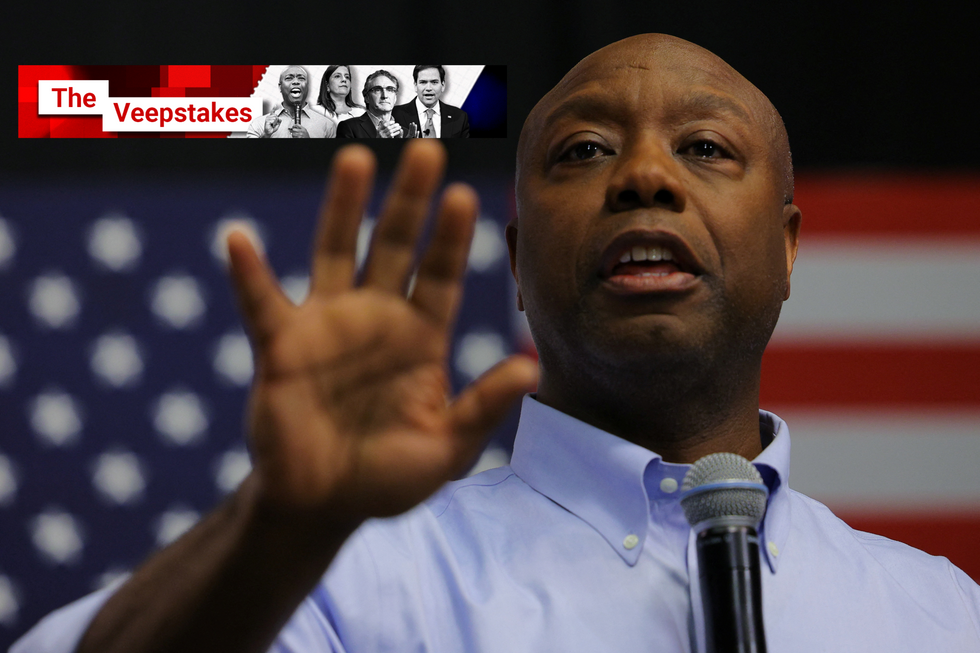
Tim Scott
South Carolina Sen. Tim Scott, who withdrew from the race for the Republican nomination last November, has been campaigning hard for Donald Trump – and he has his eye on becoming vice president. But will the GOP’s only Black senator get Trump’s VP nod?
Raised by a single mom in Charleston, South Carolina, Scott became the first Black Republican elected to any office in the Palmetto State since the 19th century when he won his 1995 Charleston city council race. In 2008, he won a seat in the statehouse and went on to the House of Representatives in 2010. After one term, then-South Carolina Gov. Nikki Haley appointed him to fill a vacant Senate seat, and he has easily won reelection three times. He is arguably the most recognizable elected Black Republican in office today. (Could Tim Scott become Trump's No. 2? Continue to read here.)
Elise Stefanik
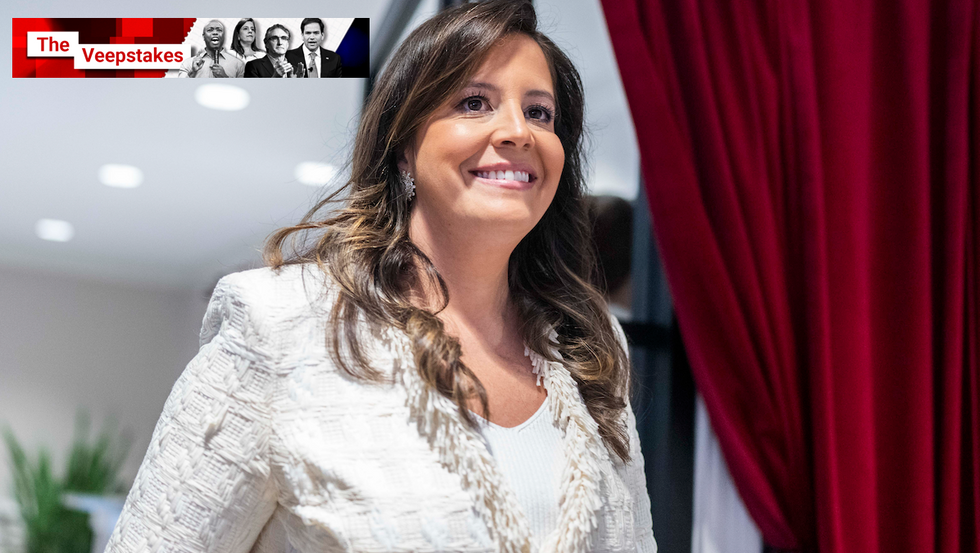
Elise Stefanik
Rep. Elise Stefanik of New York, a rising star of the GOP, is one of the few women on former President Donald Trump’s vice president shortlist.
When Stefanik first entered the national political scene in 2014, she was considered the new face of the Republican Party. At the time, she was the youngest woman ever elected to Congress and widely considered a moderate. Fast-forward to 2024, and Stefanik has drastically shifted to the right. She’s a full-blown MAGA Republican, routinely defending Trump and echoing his talking points – including the white nationalist “great replacement” conspiracy theory. (Could Stefanik, now a full-blown MAGA Republican, become Trump's running mate? Continue to read here.)
JD Vance
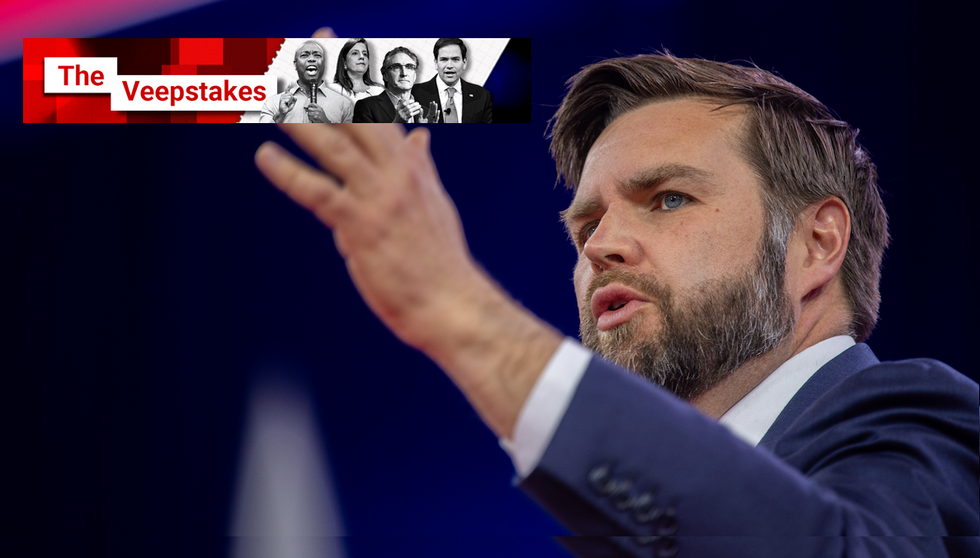
JD Vance
CNP/INSTARimages.com via Reuters
From holler to white collar. That’s the unusual life arc of J.D. Vance, the 39-year-old junior senator from Ohio.
Born into extreme poverty in rural southern Ohio, he grew up in the holler – “the hollow” – surrounded by abuse, addiction, and despair. But he made it out: He joined the Marines, graduated from Yale Law School, and became a successful tech venture capitalist.
He recounted all of this in his bestselling 2016 memoir “Hillbilly Elegy,” which became required reading after Trump’s shock victory over Hillary Clinton spurred interest in the disaffection of white working-class America. In the book, Vance criticized a culture of victimhood and dependency among poor whites while also blasting the establishment’s condescension and neglect. (Could Vance make it to the very top? Continue to read here.)
Marco Rubio
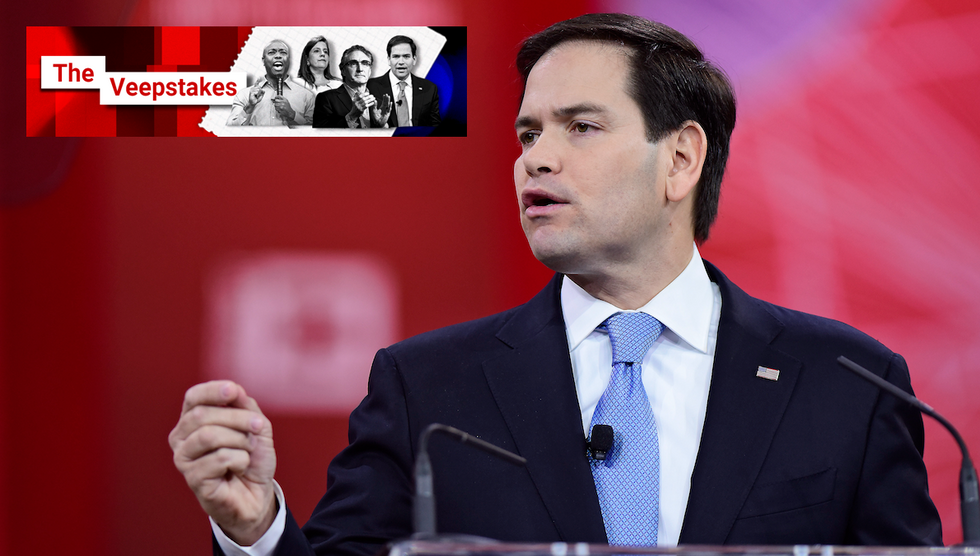
Marco Rubio
Mariana Robertson via Reuters
Florida’s senior senator earned the nickname “Lil’ Marco” for challenging Donald Trump during the 2016 primaries, but he has since forged a close alliance with the former president – so much so that some believe he could be tapped for No. 2.
Rubio was born in Miami to Cuban immigrants who arrived before the 1959 communist revolution — contrary to claims he had long made of them fleeing from Fidel Castro. He speaks fluent Spanish and got his start in politics in 1998 as a city commissioner in West Miami, where the 2000 census showed 87% of residents spoke Spanish as a first language. (Could Rubio stand a chance of becoming the first Latino VP? Find out more here.)
Doug Burgum
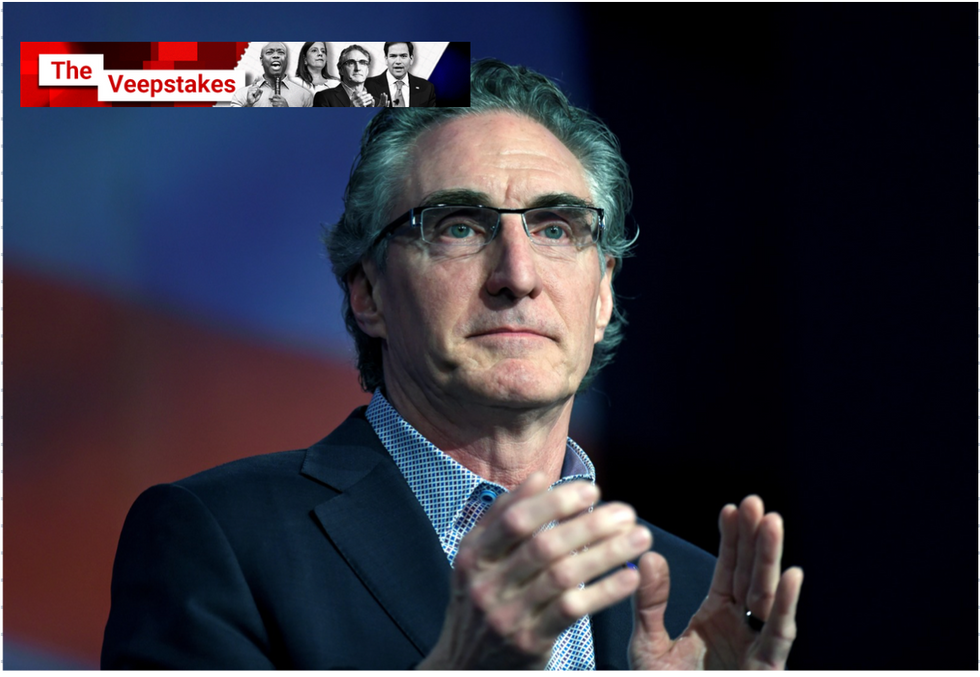
Doug Burgum
When Doug Burgum launched a campaign for the Republican presidential nomination focused on economic growth, energy production, and national security, few Americans outside of the Flickertail State had heard of the former software CEO turned governor of North Dakota. Just to get the 40,000 unique donors needed to make the debate stage, he had to give out $20 gift cards in return for $1 campaign donations. While he’s still far from a household name, he has emerged as a dark horse favorite to become Donald Trump’s vice presidential running mate.
Who is he? The 67-year-old Burgum hails from Arthur, North Dakota — a town of roughly 300 residents — and worked as a consultant at McKinsey & Co before leveraging his family farm to start an accounting software company called Great Plains Software, which he sold to Microsoft for $1.1 billion in 2001. (Would Trump fancy a biz-savvy VP pick? Find out more here.)
Wildcards: Could Trump surprise us with his VP running mate?
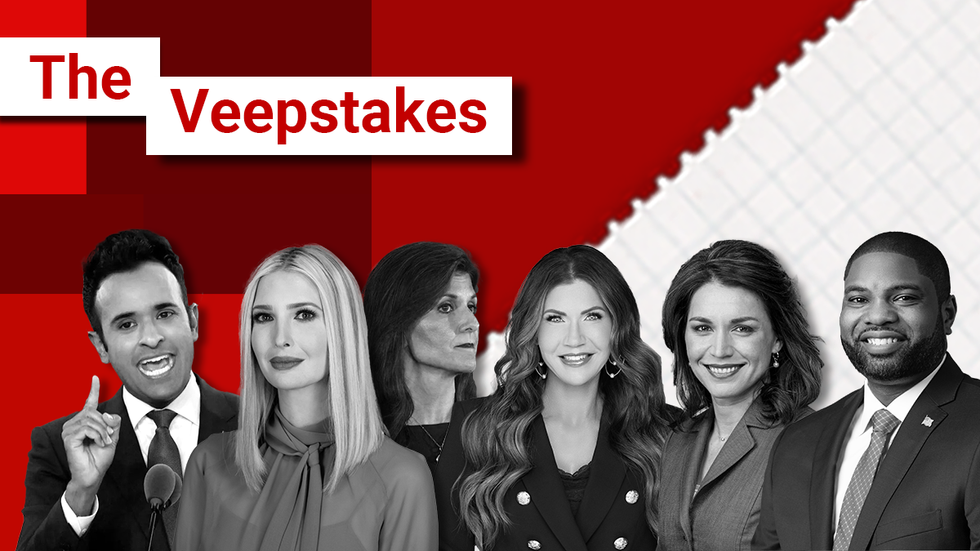
Wildcards: Could Trump surprise us with his VP running mate? Vivek Ramaswamy, Ivanka Trump, Nikki Haley, Kristi Noem, Tulsi Gabbard & Byron Donalds
Luisa Vieira/GZERO Media
Donald Trump has been teasing his vice presidential pick for weeks, but with the Republican National Convention kicking off next week, he’s likely to make it official — and soon.
Right now, the front-runners appear to be Sens. Marco Rubio and JD Vance, along with North Dakota Gov. Doug Burgum. But what about the contenders who aren’t grabbing headlines yet remain on Trump’s radar? Here is everything you need to know about the dark-horse candidates.
Nikki Haley: We know, we know, the former governor of South Carolina and Trump’s former ambassador to the UN fired shots at the former president as his main opponent in the primary. But just because she once challenged him doesn’t mean she wouldn’t be a valuable running mate. (Could Trump surprise us with his VP running mate? Find out more about his wildcard prospects here.)
- Could Doug Burgum be a biz-savvy VP pick for Trump? ›
- JD Vance: Started from the bottom, now he’s here ›
- Trump gambles to woo Black voters ›
- Trump's VP pick remains a secret ›
- Wildcards: Could Trump surprise us with his VP running mate? ›
- Trump's VP pick: The short list ›
- Trump's pick for VP: JD Vance - GZERO Media ›
Sen. Marco Rubio
Veepstakes: Could Marco Rubio become the first Latino VP?
Florida’s senior senator earned the nickname “Lil’ Marco” for challenging Donald Trump during the 2016 primaries, but he has since forged a close alliance with the former president – so much so that some believe he could be tapped for No. 2.
Rubio was born in Miami to Cuban immigrants who arrived before the 1959 communist revolution — contrary to claims he had long made of them fleeing from Fidel Castro. He speaks fluent Spanish and got his start in politics in 1998 as a city commissioner in West Miami, where the 2000 census showed 87% of residents spoke Spanish as a first language.
Rubio won election to the Florida House of Representatives through a special election in 1999 and served until 2008, rising to Speaker in 2006. He briefly taught at Florida International University before winning a seat in the US Senate, where he has served since 2011. He ran for president in 2016 but failed to outrun the Trump juggernaut – and dropped out after coming in second in his home-state primary. During Trump’s first term, he became an overt loyalist and voted to acquit Trump in his second impeachment trial for his role in the Jan. 6, 2021, attack on the US Capitol.
He’s a moderate who could make independents feel less anxious about voting for Trump, but Eurasia Group’s US Managing Director Jon Lieber says choosing him would mean the Trump campaign is “confused about their vulnerabilities since Rubio brings nothing the other candidates don’t.”
Florida and the Cuban vote are already securely in the Republican column, and Rubio isn’t likely to bring over the working-class midwesterners Trump needs to pull away from Biden.
To learn about Trump’s other possible VP picks, check out our Veepstakes series here.
